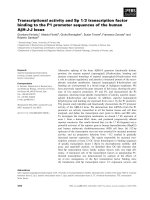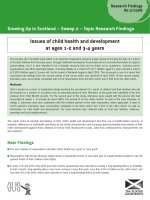Paleoclimate, part 2 from 3 million years ago to the instrumental period
Bạn đang xem bản rút gọn của tài liệu. Xem và tải ngay bản đầy đủ của tài liệu tại đây (1.2 MB, 24 trang )
Paleoclimate, part 2:
From 3 million years ago to the
instrumental period
12.340 Global Warming Science
February 16, 2012
David McGee
1
Climate change captured by
seafloor foraminifera
Increasing ice volume/
Decreasing temperature
Over the last 3 Myr:
Increasing ice volume
Decreasing temperature
Increasing variability
Cyclic changes (glacial-interglacial cycles)
Data from Lisiecki and Raymo, Paleoceanography 2005
2
Climate change over the last
1 Myr in Antarctic ice
Note: dD is just the hydrogen isotope equivalent of d18O – a larger
amplitude, but scales linearly with d18O.
3
After Jouzel et al., 2007
Oxygen (and hydrogen) isotope
fractionation
Water vapor is depleted in 18O (and D) relative to
liquid water due to the greater mass of H218O vs.
H216O
Air masses become more 18O-depleted with
increasing rain-out and decreasing temperatures
4
Image courtesy of NASA.
5
Decreasing temperature
δ18o of vapor or liquid,%0
0
-10
-20
Liquid
Vapor
-30
-40
-50
-60
0.8
0.6
0.4
0.2
0
Fraction of vapor remaining (f)
Image by MIT OpenCourseWare.
6
temperature
Where
Rv = 18O/16O ratio
Rv0 = initial 18O/16O ratio
f = fraction of vapor remaining
α = fractionation factor (~1.01)
Spatial relationship in the
modern world
Present climate (observed)
δ18o(%0)
0
-20
-40
-60
-80
-60
-40
-20
0
20
40
Mean ann. temp.(oC)
Annual δ18o in precipitation in relation to mean annual temperature at the same site,
based on data from the International Atomic Authority (Jouzel et al., 1994).
Image by MIT OpenCourseWare.
7
Climate change over the last 1
Myr in Antarctic ice
Decreasing temperature
8
After Jouzel et al., 2007
Climate change and GHGs
(kyr BP)
Climate Change 2007: The Physical Science Basis. Working Group I Contribution to the Fourth Assessment Report
of the Intergovernmental Panel on Climate Change, Figure 6.3. Cambridge University Press. Used with permission.
9
Orbital changes thought to drive
climate change on timescales of
10s of thousands of years
Eccentricity
~100 kyr
Obliquity (tilt)
~41 kyr
10
Precession
~22 kyr
Image courtesy of NASA.
Precise links between orbital
changes and glacial-interglacial
changes still debated
11
Image courtesy of Global Warming Art.
Orbital changes amplified by
GHG changes
This image has been removed due to copyright
restrictions.
Please see: Figure 1, Monnin et al., Science 2001.
on page,
/>
12
The end of the last glacial
period recorded in Antarctic
ice. The warming starts before
CO2 (and methane) rise, but
CO2 rise is an important
amplifier during the
deglaciation.
It is generally agreed that this
CO2 is coming out of the deep
ocean, but the mechanisms for
this transfer are not agreed
upon.
Climate change over the last
100,000 yrs in Greenland ice
This image has been removed due to copyright restrictions.
Please see
Grootes, P. M. and M. Stuiver (1997), Oxygen 18/16 variability in
Greenland snow and ice with 10−3- to 105-year time resolution.
J. Geophys. Res., 102(C12), 26,455–26,470, doi:10.1029/97JC00880.
13
Relationship between temperature
changes at the poles
This image has been removed due to copyright restrictions.
Please see Figure 2 on page
/>The image was published in Science, Vol. 317, No. 5839, pp.793-797,
10 August 2007. DOI: 10.1126/science.1141038.
Greenland and Antarctica vary together from glacial to interglacial, but are
out of phase during the abrupt climate changes of the last glacial period.
Abrupt climate changes in Greenland are thought to accompany ocean
circulation changes that redistribute heat to the southern hemisphere.
14
The last interglacial:
High-latitude temperatures 3-5˚C warmer than today
This image has been removed due to copyright restrictions.
Please see Figure 2 on page
/>The image was published in Science, Vol. 317, No. 5839, pp.793-797,
10 August 2007. DOI: 10.1126/science.1141038.
May have some relevance for future climate, though the warm high latitude
temperatures appear to have been caused by high obliquity and eccentricity,
not GHGs.
15
The last interglacial:
High-latitude temperatures 3-5˚C warmer than today
This image has been removed due to copyright restrictions.
Global sea levels likely at least 6.6 m higher than present (95% confidence),
and less than 9.0 m higher (33% confidence) (Kopp et al., 2009)
6 m of sea level rise implies substantial melting of both the Greenland and
West Antarctic ice sheets.
16
The last 2000 years:
temperature
Data primarily comes from:
-tree rings
-boreholes
-lake sediments
Climate Change 2007: The Physical Science Basis. Working Group I Contribution
to the Fourth Assessment Report of the Intergovernmental Panel on Climate
Change, Figure 6.11. Cambridge University Press. Used with permission.
17
The last 2000 years:
temperature
MCA =
Medieval Climatic Anomaly
(aka Medieval Warm Period)
LIA=
Little Ice Age
MCA
LIA
Climate Change 2007: The Physical Science Basis. Working Group I Contribution to the Fourth Assessment Report of
the Intergovernmental Panel on Climate Change, Figure 6.10. Cambridge University Press. Used with permission.
18
What caused the Little Ice Age?
Coincides with increased volcanic activity and
decreased solar irradiance
Climate Change 2007: The Physical Science Basis. Working Group I Contribution to the Fourth Assessment Report of
the Intergovernmental Panel on Climate Change, Figure 6.13. Cambridge University Press. Used with permission.
19
The last 2000 years:
hydrologic variability
• North American Drought Atlas
Data point to important regional-scale hydrologic
changes, e.g. drier conditions in the western U.S. during
the MCA
20
The last 2000 years:
sea level rise
This image has been removed due to copyright restrictions.
Please see Figure 2, Kemp et al., PNAS 2011
on page
/>
21
Kemp et al., PNAS 2011
A few questions for paleo-records
• Are modern conditions and rates of
change exceptional?
• What are the links between GHGs and
climate?
• What nonlinear responses exist within the
climate system?
• What climatic conditions characterized
past warm climates and warmings?
22
References
Alley, R.B.. 2004. GISP2 Ice Core Temperature and Accumulation Data. IGBP PAGES/World Data
Center for Paleoclimatology Data Contribution Series #2004-013. NOAA/NGDC Paleoclimatology
Program, Boulder CO, USA.
Jouzel, J., et al. 2007. EPICA Dome C Ice Core 800KYr Deuterium Data and Temperature Estimates.
IGBP PAGES/World Data Center for Paleoclimatology Data Contribution Series # 2007-091.
NOAA/NCDC Paleoclimatology Program, Boulder CO, USA.
Kemp, A. C., Horton, B. P., Donnelly, J. P., Mann, M. E., Vermeer, M., & Rahmstorf, S. (2011).
Climate related sea-level variations over the past two millennia. Proceedings of the National
Academy of Sciences, 108(27), 11017. National Acad Sciences.
Lisiecki, L. (2005). Pliocene-Pleistocene stack of globally distributed benthic stable oxygen isotope
records. doi: 10.1594/PANGAEA. 704257, Supplement to: Lisiecki, Lorraine E; Raymo, Maureen E
(2005): A Pliocene-Pleistocene stack of 57 globally distributed benthic d18O records.
Paleoceanography, 20.
Monnin, E. (2001). Atmospheric CO2 Concentrations over the Last Glacial Termination. Science,
291(5501), 112–114. doi:10.1126/science.291.5501.112
23
MIT OpenCourseWare
12.340 Global Warming Science
Spring 2012
For information about citing these materials or our Terms of Use, visit: />









